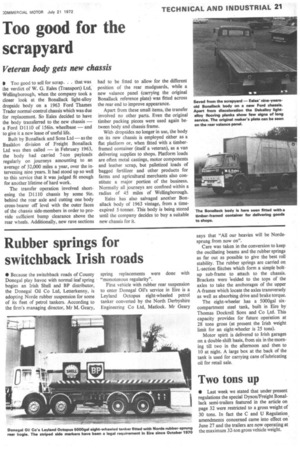Rubber springs for switchback Irish roads
Page 23

If you've noticed an error in this article please click here to report it so we can fix it.
• Because the switchback roads of County Donegal play havoc with normal leaf spring bogies an Irish Shell and BP distributor, the Donegal Oil Co Ltd, Letterkenny, is adopting Norde rubber suspension for some of its fleet of petrol tankers. According to the firm's managing director, Mr M. Geary, spring replacements were done with "monotonous regularity".
First vehicle with rubber rear suspension to enter Donegal Oil's service in Eire is a Leyland Octopus eight-wheeled petrol tanker converted by the North Derbyshire Engineering Co Ltd, Matlock. Mr Geary says that "All our heavies will be Nordesprung from now on".
Care was taken in the conversion to keep the oscillating beams and the rubber springs as far out as possible to give the best roll stability. The rubber springs are carried on L-section flitches which form a simple boltup sub-frame to attach to the chassis. Brackets were Welded to the tops of the axles to take the anchorages of the upper A-frames which locate the axles transversely as well as absorbing drive and brake torque.
The eight-wheeler has a 5000gal sixcompartment steel tank, built in Eire by Thomas Dockrell Sons and Co Ltd. This capacity provides for future operation at 28 tons gross (at present the Irish weight limit for an eight-wheeler is 25 tons).
Motor spirit is delivered to Irish garages on a double-shift basis, from six in the morning till two in the afternoon and then to 10 at night. A large box at the back of the tank is used for carrying cans of lubricating oil for retail sale.
Two tons up
• Last week we stated that under present regulations the special Dyson/Freight Bonallack semi-trailers featured in the article on page 32 were restricted to a gross weight of 30 tons. In fact the C and U Regulation. amendments concerned came into effect on June 27 and the trailers are now operating at the maximum 32-ton gross vehicle weight.




























































































